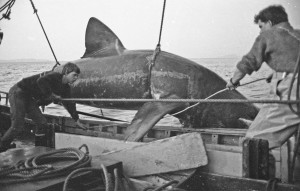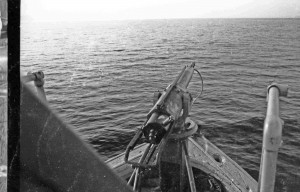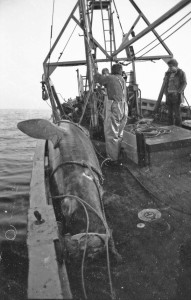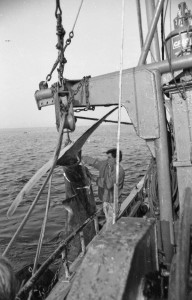Marine Life & Conservation
Basking Sharks in Cornwall
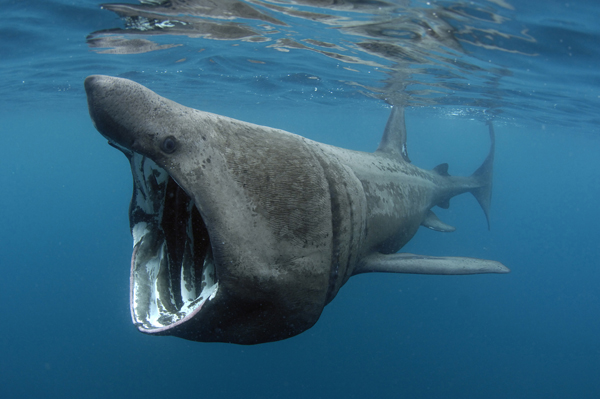
Basking sharks are the world’s second largest fish with the Whale shark taking top spot. The name ‘Basking’ comes from its habit of cruising the warmer waters near the surface as if basking in the sun. In fact they are feeding on the plankton that rises near the surface during warmer weather. The sharks are often seen near the shore with their tell tale dorsal and tail fins cutting the silky waters surface. They can grow up to lengths of around 9 metres and weigh 5 tons or more but even so they are not at all dangerous. Having said that, of course if you put your hand in its mouth or try to ride its tail then it will panic and by its shear size alone will no doubt do you harm in its attempt to escape.
I recently spent a day out along the south Cornish coast looking for the sharks with Charles Hood, a marine photographer who runs shark watching trips out of Penzance. With the knowledge that several were spotted the day before, we were confident that we would soon find them and be able to get into the water and snorkel with them. Alas, as the day went on and neared its end they were still nowhere to be found. Charles called other boats in the area and they all said what a great day it was yesterday for the sharks but none spotted today. That’s wildlife for you!
I have had some great encounters with Basking Sharks in Sennen Cove, Cornwall, when I have been out on my surf board. Letting the sharks come to me rather that chase them I have had many along side me with their great gaping mouths sieving out the plankton into their gill rakers.
I recalled to Charles a very nasty encounter I had early on in my career as a wildlife cameraman when a 6 metre shark was harpooned right in front of my eyes while I was in the water filming it. It may have been my fancy but I could hear the death groans from the shark as it battled hopelessly against the harpoon and its tether to the ship that had fired it.
After an age of struggle and pain the dying shark was hauled up to the boat where its tail was cut off. It was then tied to a buoy and left in the water to die slowly before being hauled aboard and taken back to port.
The reason for it being so brutally killed was for its liver oil which is 25-30% of its body weight. The oil is very pure and needs little refining and worth a lot of money. Thankfully now the Basking shark is protected by law.
http://www.baskingshark.ie/index.php?option=com_k2&view=item&id=56&Itemid=86
Just before going back to harbour we pulled into a small cove where I asked Charles about the sharks and the people he took out to see them.
Charles:
All sorts really, from those who have never seen a shark before to shark experts. As well as locals I get people from as far away as Hawaii, Canada and Europe. Although a few are youngsters most are in their 40-50s who have photographed sharks before around the world and want to put the Basking shark on their tick list.
Jeff:
Is Cornwall good for basking sharks?
Charles:
Yes generally from Sennen around to the west of the Lizard is best from mid May through to July and sometimes in August we get a second plankton bloom which will keep the sharks around.
Jeff:
Do they come close to the shore?
Charles:
Yes indeed, they will come right into the rocky shoreline as well as the sandy shallows of the holiday beaches.
Jeff:
How long have you been doing this?
Charles:
A good 20 years, 5 of which commercially. In the mid eighties I would come down to Cornwall just snorkelling with the sharks.
Jeff:
Over those 20 years have you noticed any difference in numbers?
Charles:
It’s hard to tell but generally I think they have increased and it seems to be juvenile 3-4 metre sharks we are seeing more of. Where as 20 years ago, you would be seeing more of the 8-9 metre sharks and I can’t really explain why that is.
Jeff:
Any changes in the last 5 years since you have been doing this commercially?
Charles:
Only the weather really. The onset of plankton has come much later as the water has been colder. So instead of the sharks being concentrated over several weeks they are spread out over a several months.
Jeff:
The other week I noticed a small boat harassing a young shark while trying to get close to it. Is there a correct way to approach them?
Charles:
Officially they are a protected species so you should not endanger or harass them in any way. The best way I find is to stay 100 metres or so away and observe how the sharks are behaving and try to predict where the sharks will be in 2 or 3 minutes time. Then that is the place to enter the water if you want to snorkel with them. In this way you are not disturbing the shark’s normal pattern and if you stay still they will swim pass you, often coming back the same way and swimming around in a set pattern. The boat then can remain 50-100 metres away.
Jeff:
How protected are the sharks in the UK?
Charles:
Endangering or harassing the sharks can make you liable to prosecution where the penalties can be quite high, somewhere in the region of £4,000 – £5,000 or 6 months in prison.
Jeff:
How should you act when in the water with the sharks?
Charles:
Once you predict were the shark is going, stay still in the water and let it pass you. If you fin after it then it will probably swim away. They often swim in large circles while feeding and so will come back to you sooner or later.
Jeff:
Are the bigger sharks more approachable?
Charles:
Yes, the larger ones are far less bothered by you being in the water where as the smaller ones around 3 metres or less are more skittish and will swim away.
Jeff:
Is there a future for basking sharks?
Charles:
Yes I think so. We are seeing more each year and the plankton at the moment is looking good. If more countries joined the UK in the protection of these sharks then they could return to a very sustainable population.
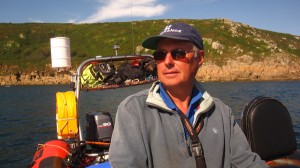 Then, just as we were about to head home, Charles had a call from another boat skipper to say there was a shark just off the rocks near the Minack Theatre. It only took 10 minutes to get there and the shark was still busily feeding in the tide line. The sun was now low and so the light was getting poor underwater but I still had to get in with the shark if possible. With great patience Charles manoeuvred us into a position where he thought the shark would be coming to. I slipped into the water, camera ready. Unfortunately the visibility was not too good but never the less the shark was heading in my direction. With my face half in, half out of the water I could see the large fin heading straight for me but underwater, not a thing. Then it appeared, only 3 metres away and swimming steadily towards me. No matter how many times I see sharks, it is always a thrill, the excitement of the first encounter, not being too sure if it will come close enough for me take some video, not sure I will spook it and it will turn away. It came closer and I started to film as it glided past me. My excitement rose as I looked into its eye and realised that it was looking directly back at me. Truly a magical moment.
Then, just as we were about to head home, Charles had a call from another boat skipper to say there was a shark just off the rocks near the Minack Theatre. It only took 10 minutes to get there and the shark was still busily feeding in the tide line. The sun was now low and so the light was getting poor underwater but I still had to get in with the shark if possible. With great patience Charles manoeuvred us into a position where he thought the shark would be coming to. I slipped into the water, camera ready. Unfortunately the visibility was not too good but never the less the shark was heading in my direction. With my face half in, half out of the water I could see the large fin heading straight for me but underwater, not a thing. Then it appeared, only 3 metres away and swimming steadily towards me. No matter how many times I see sharks, it is always a thrill, the excitement of the first encounter, not being too sure if it will come close enough for me take some video, not sure I will spook it and it will turn away. It came closer and I started to film as it glided past me. My excitement rose as I looked into its eye and realised that it was looking directly back at me. Truly a magical moment.
You can find details of trips with Charles at http://charleshood.com/snorkel-with-sharks
Marine Life & Conservation
Paul Watson Released as Denmark Blocks Japan’s Extradition Bid

Renowned anti-whaling activist Paul Watson has been released from custody in Greenland after spending five months in detention. Denmark’s Justice Ministry rejected Japan’s request for his extradition, citing insufficient guarantees that his time already served in custody would be credited against any potential sentence.
The 74-year-old Canadian-American was arrested on July 21 in Nuuk, Greenland’s capital, when his ship docked to refuel. His arrest was based on a 2012 Japanese warrant related to a 2010 encounter in Antarctic waters. Japan alleged Watson obstructed operations and caused damage to a whaling research ship during efforts to disrupt illegal whaling. Watson has consistently denied these claims, maintaining his commitment to marine conservation.
Denmark, which oversees extradition matters for Greenland, concluded that while the legal conditions for extradition were met, the lack of assurances from Japan regarding time-served credit made extradition untenable.
In a video shared by his foundation, Watson expressed gratitude and relief, saying, “After five months, it’s good to be out… and good to know they’re not sending me to Japan.” He added that the most difficult part of his time in custody was being separated from his two young sons.
Watson is a pioneering figure in marine conservation, known for founding the Captain Paul Watson Foundation in 2022 after decades of activism with the Sea Shepherd Conservation Society. His bold efforts to defend marine life have earned him widespread support, including from celebrities and conservationists. His work has also been featured in the acclaimed reality TV series Whale Wars.
Watson’s lawyer, Jonas Christoffersen, praised the decision, stating, “We are happy and relieved that Paul Watson is now free.” He added that Watson is eager to reunite with his family and continue his vital work.
The arrest occurred while Watson’s vessel, the M/Y John Paul DeJoria, was en route to the North Pacific with a team of 26 volunteers to intercept a Japanese whaling ship. His foundation described the arrest as politically motivated and emphasized that Watson’s actions were focused on ending illegal whaling practices.
Japan resumed commercial whaling in 2019 after leaving the International Whaling Commission, asserting that whale meat is a cultural tradition. Conservationists, however, continue to challenge these practices, highlighting their impact on marine ecosystems.
Despite the challenges, Watson remains steadfast in his mission to protect marine life and bring attention to whaling practices. His dedication to ocean conservation has made him a globally respected advocate for the environment.
Marine Life & Conservation
12 Days of Zero-Waste Fish-mas

This holiday period, the Marine Conservation Society, the UK’s leading ocean membership charity, invites you to make some simple changes to eating fish this Christmas to help our seas.
Dr Kenneth Bodles, Head of Fisheries and Aquaculture at the Marine Conservation Society, said, “During the festive season, our consumption increases, but so does waste. Sustainability isn’t just about where food comes from – it’s also about how you use it. By reducing waste and making the most out of your seafood, you’re not only taking steps to be more ocean-friendly, but can also help to cut costs during what is often one of the most expensive times of the year”.
The Marine Conservation Society has compiled twelve tips on how to consume seafood sustainably with zero-waste this Christmas:
Buy whole fish instead of fillets
Instead of fillets, consider buying whole fish such as salmon, hake, or lemon sole. By adopting a “nose to tail” approach with cooking, whole-baked fish not only feeds a crowd, but also helps to minimise waste and maximise sustainability by using up every part of the animal, including bones, skin, and fat.
Make fish stock
Leftover fish bones or shells can be put to good use by boiling them to make a nourishing fish stock or bisque. This can be frozen and preserved for later use and makes for a flavourful base in a soup.
Make your own fish pâté
Avoid waste by turning leftover fish, such as smoked mackerel or salmon, into a delicious pâté by blending with cream cheese and lemon. Perfect when paired with crackers.
The sustainability of salmon and mackerel varies depending on where and how it is caught or farmed. For more information on green-rated options, check the charity’s Good Fish Guide.
Buy frozen
By purchasing seafood that is frozen or vacuum-packed, this helps to reduce waste by extending the shelf life of your food.
Fish pie
If you’re wondering what to do with leftover cooked fish, why not opt for a classic fish pie with mashed potatoes, leeks, and a cheesy sauce? A sure crowd pleaser on Boxing Day.
Use the head
Don’t forget the fish head! The meat is incredibly tender and flavourful. The charity recommends a cod’s head curry or recreating Fallow’s renowned cod’s head in siracha butter.
By stretching your ingredients further, not only is this a more sustainable way to enjoy seafood, but also cost-effective by repurposing leftovers and cooking creatively.
Boxing Day brunch
Mix leftover kippers or smoked salmon with scrambled eggs for a tasty, zero-waste, Boxing Day brunch.
For best choice, make sure you buy kippers, or herring, from the North Sea and the North Irish Sea.
Zero-waste storage
A top tip from the Marine Conservation Society to avoid waste is freezing fish offcuts to save for future use.
Crisp up the skin
Even leftover fish skin can be turned into a quick savoury snack by crisping it up in an air fryer with a little olive oil and salt.
Anchovies two ways
Leftover anchovies can either be blended with butter to make a delicious anchovy butter or tossed into pasta for a hit of umami flavour.
The charity recommends opting for anchovies caught in the Bay of Biscay for best choice.
Fishcakes
For an easy, zero-waste meal, leftover seafood trimmings can be mixed with mash and fried in breadcrumbs to make fishcakes.
Pickled mussels
Try pickling mussels in 1:1 vinegar and water, with a dash of sugar for a sustainable, zero-waste snack that can be enjoyed well beyond the festive season.
Mussels farmed in the UK are a seafood superhero. Grown using low-impact methods and harvested by hand, they get all the food they need from the sea around them. This makes them one of the most sustainable, ocean-friendly, and cost-effective seafood options.
Players of People’s Postcode Lottery have raised £6.6M towards the Marine Conservation Society’s vital work in making seafood more sustainable.
Laura Chow, Head of Charities at People’s Postcode Lottery, said: “Fish is a festive favourite for many, but making sustainable choices when it comes to how we buy and eat seafood makes all the difference for our ocean. Support from players of People’s Postcode Lottery has helped the Marine Conservation Society further its sustainable seafood work, so that we can all enjoy healthier, better protected seas.”
The Marine Conservation Society encourages you to make sustainable seafood choices a year-round habit, not just for Christmas. To check how sustainable the seafood on your plate is, you can visit the charity’s Good Fish Guide. The Guide helps consumers and businesses identify the most sustainable seafood using a simple traffic light system, based on where and how species are caught or farmed. Green is the best choice, amber means improvements are needed, and red indicates fish to avoid buying.
Zero-waste gift idea
Why not embrace a zero-waste Christmas by gifting a membership to support marine conservation? It’s a meaningful, low-waste gift that helps protect our ocean for generations to come. Memberships start from as little as £5 a month – the price of a sandwich and drink from your local coffee shop.
Find the latest sustainable seafood advice for wild-caught and farmed seafood on the Good Fish Guide, downloadable to your phone from www.mcsuk.org/goodfishguide.
-

 News2 months ago
News2 months agoIconic SS United States to become the World’s Largest Artificial Reef
-

 News3 months ago
News3 months agoBook Review – 52 Assignments: Underwater Photography
-

 Gear News3 months ago
Gear News3 months agoDYNAMICNORD – New German diving brand enters the British market
-

 News3 months ago
News3 months agoExploring Cenote El Pit: A Diver’s Dream
-

 Gear News3 months ago
Gear News3 months agoTry BARE drysuits (and maybe even win one!) this Friday with Sea & Sea at North West Dive Fest
-

 Marine Life & Conservation3 months ago
Marine Life & Conservation3 months agoBook Review: Coral Triangle Cameos
-

 Blogs2 months ago
Blogs2 months agoDive the Egyptian Red Sea this Autumn with Regaldive
-

 News3 months ago
News3 months ago2024 Ocean Art Underwater Photo Competition Announced


